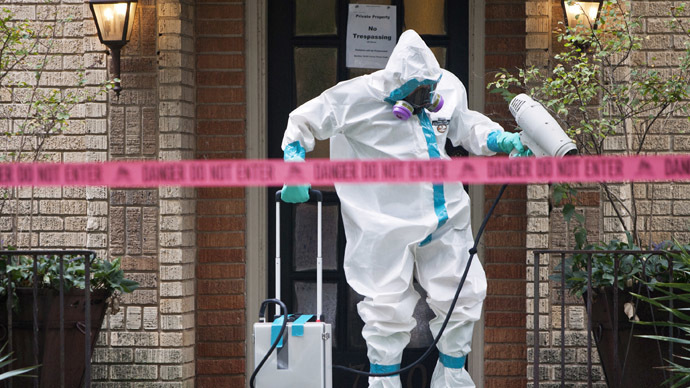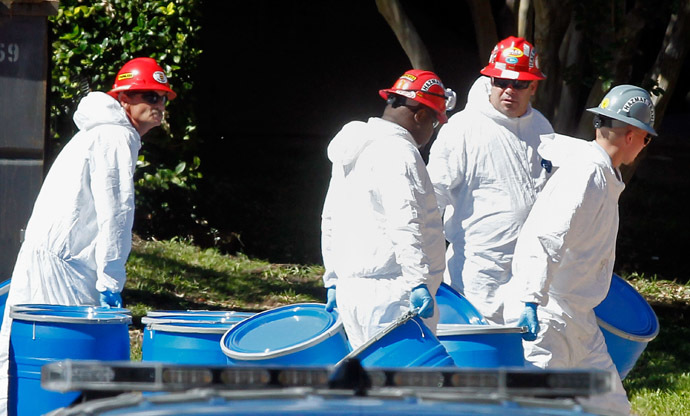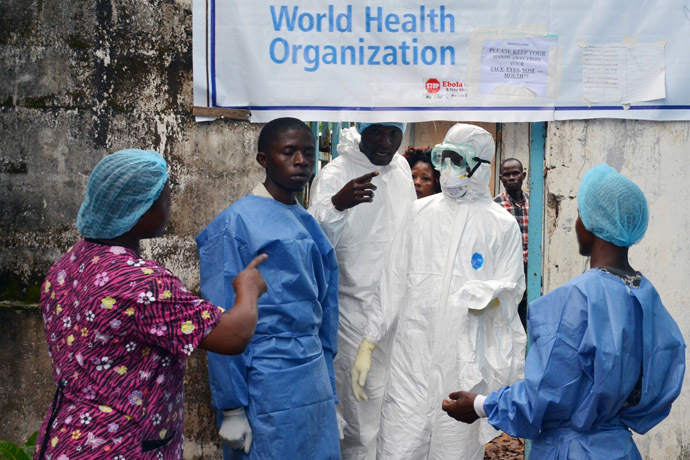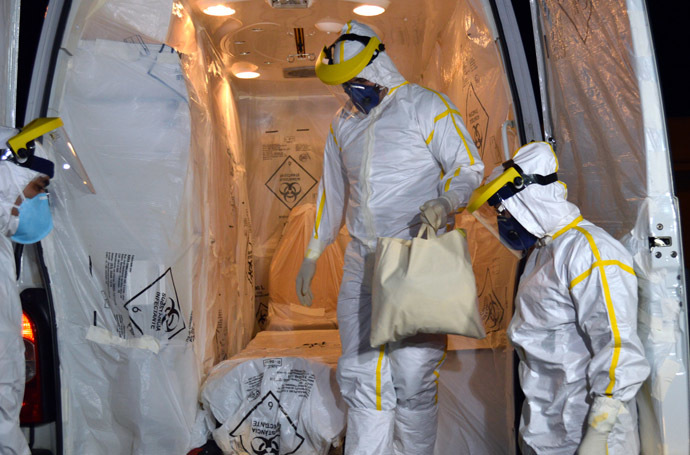‘No Ebola containment till all transportation is stopped’

The Ebola spread can’t be stopped till transportation from endemic areas is banned, Lee Hieb from the Association of American Physicians and Surgeons told RT. She added that people have to understand that help will come, but they need to stay put.
RT:As we've heard, a second healthcare worker has become infected in the US. Are American hospitals prepared for an Ebola outbreak?
Lee Hieb: I don’t know that anybody can be prepared for an Ebola outbreak, but the real problem here is that we don’t have the right protective gear in our hospitals. I think what the head of the CDC [Centers for Disease Control and Prevention] is now saying makes a lot more sense than his original plan. Now he is planning on sending specialized crews to any place where there is an Ebola outbreak. That’s what we should have done initially.
Associate Professor of Emergency Medicine Dr. Joshua Mugele on Ebola outbreak: “Every time you are dealing with highly contagious and highly infectious diseases there is always risk, but we face this risk every day when we are dealing with tuberculosis, HIV, hepatitis. The difference with Ebola is that is has a high mortality rate. So to say that the Western healthcare system is unprepared is not exactly true. Accidents can happen anywhere. We are prepared to deal with it, it’s just a difficult disease to contain.”
Unfortunately, we talk about bio-containment and biohazard - we only have four bio-containment hospitals in America, all the others are just standard hospitals. And the idea of contagion control in a standard hospital is paper gown, latex gloves, masks and a face shield – that’s really inadequate for Ebola. If you look at what they use at Fort Detrick where they do the research on high-level pathogens, they are actually using a special biohazard suit and they have wash-down facilities, so before you take your suit off you decontaminate it.
READ MORE:2nd Dallas nurse with Ebola flew with 132 passengers day before showing symptoms
I wasn’t there, but I suspect when they are talking about breaking protocol what happened is - I’m a surgeon and it’s not easy always to take off these gowns and gloves and do it correctly so you don’t touch any part of yourself when you are doing it - and that is what I suspect happened. This is so infectious that anything on the gowns and gloves can be transported to you.

RT:President Obama says the Ebola situation needs to be monitored more aggressively. What does he mean by this?
LH: I have no clue what he means by this: he has also told us that you can’t get it from somebody on the bus - which is completely not true. We have a history of dealing with contagions that have no treatment. The classic model is smallpox, and quite frankly, the way we have dealt with in historical past with contagions is stopping transportation and everybody seems to be unwilling to do that.
We should have not allowed transportation from endemic areas to the US initially, but people didn’t want to offend anybody. I don’t know what the whole rational was, I’m not a psychologist. That was just a wrong move. Now we are facing people coming in multiple ports, we have 20 flights a day that are coming to America from endemic Ebola areas. And that doesn’t make sense to me. You can’t take care of contagion like this unless you stop transportation.
Liberia specifically, they need to stop transportation out of Liberia, they need to stop transportation within Liberia to save their own people. People can be safe in their homes, they just have got to understand that help will come to you, you need to not move. If you don’t move, this will burn out. So transportation is the key to this whole thing.

RT:The US is sending thousands of troops to West Africa to provide medical, logistical and security support. Is that a good idea? Couldn't they get infected too?
Associate Professor of Emergency Medicine Dr. Joshua Mugele on Ebola outbreak: “Ebola will kill more people and more people will be infected, but I have confidence that it will be eventually stopped. The biggest tragedy, in my mind, is that devastating effect that it will have on infrastructure of these West African nations – healthcare systems will lose doctors and nurses, there is going to be food crisis in Liberia because on the restrictions on travel. Even once Ebola is gone people will still need to have babies, they will still need care for HIV and tuberculosis. The systems that are in place already will be even worse than before.”
LH: That is an issue. I’m not really in the program. I used to be a military surgeon. I don’t understand the logistics train behind them. In the past for operations off Liberia we used amphibious ships - but that would be a disaster, I think, to take an infected person or people that you don’t know for sure infected and transport them to the‘amphib’ ship off the coast. We can fly people back, we have airport capabilities over there, so they are talking about bringing them back, quarantining them in some area - I heard Washington, DC, I don’t know if that’s true – for 21 days. OK, that makes some sense.
The issue is it doesn’t make sense to send our troops at the beginning. We are not doing the basic things we need to be doing to contain a contagion. I think we should do that first before we commit US ground troops. We have a kind of history of committing troops without good strategic thinking. What is our plan? I have never heard the plan. Let’s make this point: 16 doctors from Doctors Without Borders and other doctors from the US and now nurses have got themselves infected, and these are trained personnel, highly-trained people. Now we are going to send Lance Corporal Smith over there - don’t think we are going to get away from this without having some of these guys get infected. We are sending then into a harm’s way and we should have a good reason to do so.

RT:Lots of attention is now on Ebola. Is it hype or a real threat?
LH: This was always out there waiting and one of the reasons I’m here talking to you today is that I go around and I have given talks to doctors for disasters preparedness, on bioweapons, and my concern has always been smallpox. Smallpox would be even worse than this, far worse than this, and my point has been that we need to pay attention that it is out there, it’s not a matter of if, it’s a matter of when. We need to vaccinate on a voluntary basis our first-responders. We need to be thinking ahead before these things hit us.
I think we are going to get control of this, we are going to be forced to do the right thing. From what I hear, the CDC now sounds more promising than what they were doing initially which was seems to be more damage control than it was really contagion control. This is a big deal - don’t let anybody kid you that it’s not a big deal. I tell people if they are worried about themselves, just stay put. This is not truly airborne in the sense it flies through veins. In the last case of smallpox in Europe a man just through breathing had his breath go out of the window and go into another window in the hospital and killed six student nurses. That’s how bad smallpox is. Ebola doesn’t do that, but it is very infections to contact. So it’s a bad deal.
The statements, views and opinions expressed in this column are solely those of the author and do not necessarily represent those of RT.
The statements, views and opinions expressed in this column are solely those of the author and do not necessarily represent those of RT.












